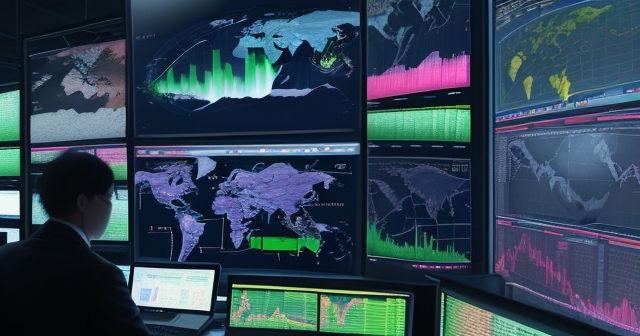Embarking on a Forex Trading Career: Navigating the World’s Largest Market
Have you ever considered a path where global economic shifts, central bank pronouncements, and even political events directly influence your daily work? Welcome to the world of a Forex Trading Career. The foreign exchange market, or FX market, is the undisputed titan of global finance, boasting an astronomical daily trading volume that eclipses all other financial markets combined. Imagine a market where trillions of dollars change hands every single day – in 2022 alone, the average daily volume reached a staggering $7.5 trillion. This immense scale translates into unparalleled liquidity, a characteristic that fundamentally shapes what it means to be a Forex Trader.
For both the aspiring beginner and the seasoned investor looking to deepen their understanding of technical analysis, the FX market presents a unique ecosystem. It’s a space defined by constant movement, intricate interdependencies, and the relentless flow of information. Unlike trading stocks on a centralized exchange, the Foreign Exchange market operates primarily over-the-counter (OTC), a decentralized network of banks, corporations, and individual traders. This structure offers certain advantages, like 24/7 trading access, but also introduces complexities regarding price determination and transparency. As we journey together through this article, we will peel back the layers of this dynamic market, examining the realities, demands, and potential rewards of pursuing a Forex Trading Career.

To truly grasp the nature of a Forex Trading Career, you must first appreciate the environment in which it exists. The sheer size of the Foreign Exchange Market is its defining feature. This isn’t just a large market; it is the largest, dwarfing equity and bond markets. This scale is largely driven by the fundamental need for global commerce – businesses constantly exchange currencies to facilitate international trade and investment. But beyond commercial needs, a significant portion of this volume comes from speculative trading, where participants aim to profit from currency price movements.
One of the most compelling attributes of the FX market for traders is its liquidity. High liquidity means that you can typically buy or sell a currency pair quickly and with minimal impact on its price. This is crucial for executing trades efficiently and minimizing slippage, especially when dealing with major currency pairs like EUR/USD or USD/JPY. The market’s 24/7 nature, spanning trading sessions across Asia, Europe, and North America, provides flexibility, allowing traders to participate at times that suit their schedule, though it also demands vigilance and the potential for round-the-clock monitoring, depending on your strategy.

However, the OTC structure introduces nuances. Unlike regulated exchanges with central clearing houses, the FX market relies on direct transactions between participants. While large interbank networks ensure deep liquidity among major players, retail traders typically access the market through brokers. The quality and reliability of your broker become paramount in this decentralized environment. The structure can also make price determination less transparent compared to exchange-based markets, as prices might vary slightly between brokers, though competition usually keeps these differences minimal for major pairs. Understanding this fundamental structure is the first step in appreciating the practicalities of Forex Trading.
Understanding the FX Market’s Unique Landscape: Size, Liquidity, and Structure
Why do so many individuals consider a Forex Trading Career? The advantages are compelling, particularly when viewed from the perspective of accessibility and potential profitability. Let’s explore some of the key benefits that draw traders to this market.
- Low Entry Costs: Compared to trading stocks or futures, starting out in Forex Trading can require relatively low initial capital. Many brokers offer micro accounts, allowing you to begin trading with a small deposit.
- High Liquidity: As we discussed, the market’s depth ensures you can typically enter and exit positions quickly and efficiently. This minimizes the risk of being stuck in a trade due to a lack of buyers or sellers.
- 24/7 Market Access: The global, continuous nature of the FX market means you can trade whenever the major financial centers are open, offering significant flexibility, especially for those balancing trading with other commitments.
- Variety of Currency Pairs: You have access to a vast array of currency pairs, from the highly liquid majors (like EUR/USD, GBP/USD, USD/JPY) to exotic crosses. This provides numerous opportunities across different economic and geopolitical landscapes.
- Leverage: This is arguably the most attractive, yet riskiest, feature. Leverage allows you to control a much larger position size with a smaller amount of capital. While it can amplify profits, it also dramatically magnifies losses.
- Focus on Analytical Skills: Success in Forex Trading heavily relies on developing strong analytical abilities, both Technical Analysis (chart patterns, indicators) and Fundamental Analysis (economic data, central bank policy). This intellectual challenge is rewarding for many traders.

These advantages, particularly the combination of accessibility and the potential for leveraged returns, make the FX Market an attractive proposition. However, it’s crucial to understand that these benefits are inextricably linked to significant challenges and risks that demand careful consideration and preparation.
The Double-Edged Sword: High Leverage and Magnified Risk
Leverage is a core component of retail Forex Trading, and understanding its implications is non-negotiable for anyone considering this career path. In essence, leverage is borrowed capital provided by your broker to increase your trading position size. Instead of needing $100,000 to control a standard lot of currency, with 50:1 leverage, you only need $2,000 of your own capital (margin). This means a small price movement can result in a proportionally much larger profit or loss relative to your initial capital.
Think of leverage like a magnifying glass for both gains and losses. If a currency pair moves favorably by just 1%, leverage of 50:1 could turn that 1% move into a 50% gain on your deposited margin. Sounds great, doesn’t it? But the reverse is also true. A mere 1% adverse move could wipe out 50% of your margin. With higher leverage, say 200:1 or even more offered by some offshore brokers, the potential for rapid and substantial losses becomes even more acute.

This inherent characteristic of the FX market makes Risk Management not just important, but absolutely critical. Many novice traders, seduced by the prospect of high returns with low initial capital, fail to appreciate the catastrophic potential of excessive leverage. A single unfavorable trade without proper risk controls could lead to a margin call, where your broker closes your positions automatically because your equity has fallen below the required maintenance margin. This can happen very quickly in a volatile market, underscoring the need for discipline and a deep understanding of how leverage impacts your exposure.
The Challenges Beyond Risk: Transparency, Complexity, and Self-Reliance
While leverage and risk are the most highlighted challenges, a Forex Trading Career presents other significant hurdles that aspiring traders must confront. The OTC nature of the market, mentioned earlier, can lead to a perceived lack of transparency, especially for retail traders. Unlike a centralized exchange where all orders contribute to a single, visible order book, retail FX prices are often influenced by your specific broker’s liquidity providers. While competition among brokers generally keeps prices competitive, there isn’t the same level of universal price discovery seen in equity markets.
Furthermore, the factors influencing currency prices are incredibly complex and interconnected. Price determination is a function of not just economic data (like CPI or NFP reports), but also central bank policies (interest rates, quantitative easing), geopolitical events, political stability, market sentiment, and even large institutional flows. Disentangling these forces and predicting their impact requires continuous, sophisticated analysis. It’s a puzzle with constantly changing pieces, demanding intellectual rigor and adaptability.

Perhaps one of the biggest, yet often overlooked, challenges is the requirement for intense self-directed learning and emotional resilience. A Forex Trader, especially an independent one, is essentially running a small business. There’s no boss, no guaranteed salary, and no structured training program provided by the market itself. You are responsible for your education, developing your trading plan, managing your capital, and most importantly, managing your own psychology in the face of wins and losses. This demands a high level of self-discipline, perseverance, and the ability to learn from mistakes without succumbing to emotional impulses like fear or greed.
Mastering the Analytical Toolkit: Technical and Fundamental Analysis
Success in Forex Trading is heavily predicated on your ability to analyze market information and make informed decisions. This typically involves proficiency in two primary forms of analysis: Technical Analysis and Fundamental Analysis. While some traders specialize in one or the other, a comprehensive understanding of both provides a more robust framework for navigating the complexities of the FX market.
Technical Analysis focuses on studying historical price data and trading volume to predict future price movements. The core belief is that market behavior is reflected in price patterns and trends, and that history tends to repeat itself to some extent. As a technical analyst, you would spend your time looking at charts, identifying trends, support and resistance levels, and using various indicators like Moving Averages, RSI, MACD, and Fibonacci retracements. The goal is to identify potential entry and exit points based on recurring patterns and mathematical calculations. For traders keen on delving deep into chart reading, mastering these tools is essential.
Fundamental Analysis, on the other hand, examines the underlying economic, social, and political forces that influence currency values. It involves analyzing economic reports (GDP, inflation data, employment figures), central bank announcements (interest rate decisions, monetary policy statements), government policies, geopolitical events, and even natural disasters. The fundamental analyst seeks to determine the intrinsic value of a currency relative to another and predict how upcoming events might shift this balance. For instance, a hawkish stance from the FOMC suggesting potential interest rate hikes would fundamentally strengthen the USD, impacting pairs like EUR/USD and USD/JPY. Both technical and fundamental analysis require continuous learning and adaptation, as market dynamics are constantly evolving.
Key Market Drivers: Central Banks, Economic Data, and Global Events
Let’s delve deeper into the primary forces that move currency markets. Understanding these drivers is crucial for any trader, as they often trigger significant volatility and directional trends. At the forefront are Central Banks, such as the U.S. Federal Reserve (FOMC), the European Central Bank (ECB), the Bank of Japan (BOJ), the Bank of England (BOE), the Reserve Bank of Australia (RBA), and the Swiss National Bank (SNB). Their monetary policy decisions, particularly regarding interest rates, are arguably the single most influential factor on currency valuations. Higher interest rates tend to attract foreign investment seeking better returns, increasing demand for that currency and driving its value up.
Beyond interest rates, central bank commentary and forward guidance (how they signal future policy intentions) are closely scrutinized by traders. Any hint of a shift in monetary policy, whether hawkish (leaning towards tightening) or dovish (leaning towards easing), can cause rapid price swings. For example, recent commentary from the ECB or the BOJ’s stance on FX moves are constant points of analysis in the market.
Another powerful driver is the release of key Economic Reports. Data points like the Consumer Price Index (CPI) indicating inflation, Non-Farm Payrolls (NFP) showing employment figures, or GDP growth reports provide insights into the health of an economy. Strong economic data can increase the likelihood of central bank tightening and attract investment, boosting the currency. Conversely, weak data can have the opposite effect. Traders must be prepared to react quickly and understand the potential impact of these scheduled releases.
Finally, Geopolitical Developments and political uncertainty play a significant role. Elections (like potential Biden-Trump debates), political instability in a region (Eurozone uncertainty), or major international events can create significant uncertainty and influence capital flows, directly impacting currency valuations. For example, safe-haven currencies like the CHF or JPY (though JPY has shown recent weakness against the USD influenced by yield differentials) may strengthen during times of global stress.
The Psychological Battlefield: Discipline, Mindset, and Emotional Control
While analytical prowess is foundational, many experienced traders will tell you that the biggest challenge in Forex Trading is psychological. The market doesn’t care about your feelings, your hopes, or your fears. It moves based on collective supply and demand, driven by human participants who are themselves subject to emotions. Developing the right mindset and maintaining strict discipline is paramount to long-term success and survival in this highly competitive arena.
Consider the impact of a losing trade. It’s easy to feel frustrated, angry, or scared. These emotions can lead to impulsive decisions, such as chasing losses by taking on excessive risk, abandoning your trading plan, or exiting winning trades too early out of fear of losing profits. Conversely, a string of winning trades can breed overconfidence, leading to larger position sizes or neglecting risk management rules.
Mental discipline involves sticking to your predefined trading plan regardless of emotional state. This plan should outline your strategy, including entry and exit criteria, position sizing rules based on your acceptable Risk Management limits, and rules for managing trades. Successful traders cultivate patience, waiting for high-probability setups, and the discipline to cut losses quickly when a trade goes against them. They understand that losses are an inevitable part of trading and view them as learning opportunities rather than failures. Building this mental fortitude takes time, experience, and conscious effort, often through practices like journaling trades and reviewing performance objectively.
Building a Forex Trading Career: Skills, Education, and Continuous Learning
So, what does it practically take to build a Forex Trading Career? While there isn’t a single mandated educational path, a strong foundation in economics, finance, or mathematics can certainly be beneficial. However, many successful traders come from diverse backgrounds, demonstrating that formal education isn’t the sole determinant of success. The key is acquiring the right skills and committing to relentless, self-directed learning.
- Analytical Proficiency: The ability to interpret charts, indicators, economic reports, and global events.
- Risk Management Expertise: Understanding how to calculate position sizes, set stop-losses, use hedging strategies, and protect your capital.
- Mental Discipline: Controlling emotions, sticking to your plan, maintaining patience, and managing stress.
- Statistical and Probabilistic Thinking: Understanding that trading is about managing probabilities, not predicting the future with certainty.
- Adaptability: Markets change, and your strategies must evolve.
- Technological Literacy: Becoming proficient with trading platforms, charting software, and data feeds.

Continuous learning is non-negotiable. The market is constantly changing, new strategies emerge, and economic landscapes shift. Successful traders are perpetual students, reading books, analyzing market commentary (from sources like Forexlive or Investopedia), studying charts, and reviewing their own trading performance rigorously. Building a career isn’t about finding a magic formula; it’s about developing a robust process, refining your edge, and consistently applying sound Risk Management principles over time.
Work Environments and Compensation for Forex Traders
Where might a Forex Trader work, and what can they expect regarding compensation? The image of a lone trader working from home is popular, but Forex Trading Career paths exist in various professional settings as well. While retail trading is a significant segment, institutional trading desks are where the largest volumes are executed.
Professional Forex Traders are employed by:
- Investment Banks: Trading for the bank’s own book (proprietary trading) or facilitating large client transactions.
- Multinational Corporations: Hedging currency risk associated with international business operations.
- Hedge Funds and Asset Managers: Using FX trading as part of broader investment strategies or pure currency speculation funds.
- Government Agencies and Central Banks: Managing national reserves or intervening in markets to influence exchange rates (though this is less common now than historically for G10 currencies).
- Proprietary Trading Firms: Trading the firm’s capital with strict risk limits.
Compensation varies significantly based on the employer, experience level, and crucially, performance. Entry-level positions in institutional settings might offer a base salary, but a substantial portion of a professional trader’s income comes from bonuses tied directly to their trading profitability. This creates a high-pressure environment where performance is constantly evaluated. Independent retail traders, on the other hand, have no fixed salary; their income is solely derived from their trading profits (after deducting expenses like broker commissions or spreads), making it a high-risk, high-reward path with no income floor.
Choosing Your Platform and Taking the First Steps
If you’re reading this and feeling drawn to the intellectual challenge and potential of the Forex Trading Career, how do you take those initial steps? Beyond acquiring knowledge, choosing the right tools and environment is critical. This starts with selecting a reliable Forex Broker.
Choosing a broker involves considering factors like:
- Regulation: Ensure the broker is regulated by reputable authorities (like ASIC, FSCA, FCA, etc.) to protect your funds and ensure fair practices.
- Trading Platforms: Do they offer industry-standard platforms like MT4 or MT5, or robust proprietary platforms? The platform is your interface with the market, so it needs to be stable, user-friendly, and equipped with the necessary charting and analysis tools.
- Spreads and Commissions: These are your transaction costs. Look for competitive spreads (the difference between the buy and sell price) or low commission structures.
- Available Instruments: Beyond major currency pairs, do they offer minors, exotics, commodities (like Gold), or indices if you plan to diversify?
- Customer Support: Is support readily available, especially in your language and during trading hours?
- Account Types and Minimum Deposit: Do they offer account types suitable for beginners (like micro or mini accounts) and do the minimum deposit requirements fit your starting capital?
If you’re considering starting Forex Trading or exploring more CFD products, then Moneta Markets is a platform worth considering. It originates from Australia and offers over 1000 financial instruments, suitable for both beginners and professional traders.
Once you’ve chosen a broker, we strongly recommend starting with a demo account. This allows you to trade with virtual money in real market conditions, practicing your strategy and getting comfortable with the platform without risking real capital. This is an essential phase for developing skills and refining your trading plan before committing live funds. Remember, patience and a structured approach are your greatest allies when starting out.
Forging Your Path in the FX Market: Perseverance and Adaptability
Forging a successful Forex Trading Career is not a sprint; it’s a marathon demanding continuous effort and evolution. The market is a constantly shifting entity, influenced by a relentless stream of financial data, political shifts, and evolving global narratives. What worked last year might not work today, requiring traders to remain adaptable and open to refining their strategies.
Perseverance is key. You will experience losses. Even the best traders have losing trades and losing periods. The ability to learn from these setbacks, analyze what went wrong (Was it execution error? Flawed analysis? Poor risk management? Emotional trading?), and move forward without losing confidence is critical. This resilience is built over time, through experience and a commitment to objectivity.
Furthermore, understanding the nuances of specific currency pairs and their drivers is vital. Trading USD/JPY requires attention to U.S. bond yields and BOJ policy, while EUR/USD is heavily influenced by the ECB and Eurozone economic health. As you gain experience, you may find yourself specializing in certain pairs or types of market conditions. Building this deep market knowledge takes time and dedicated study.
In choosing a trading platform, Moneta Markets‘ flexibility and technological edge are worth noting. It supports popular platforms like MT4, MT5, and Pro Trader, combining high-speed execution with competitive spread settings to provide a solid trading experience.
Conclusion: A Demanding Yet Potentially Rewarding Endeavor
A Forex Trading Career is undeniably one of the most challenging paths in the financial world, but for those who are well-prepared, disciplined, and possess a thirst for continuous learning, it can also be immensely rewarding. We have explored the sheer scale and liquidity of the FX Market, its accessibility through leverage (while emphasizing the commensurate risk), the complexities of price determination driven by central banks, economic data, and geopolitics, and the absolute necessity of mastering both analytical skills and psychological discipline.
The allure of controlling your own schedule, the intellectual stimulation of analyzing global events, and the potential for significant financial gain are powerful motivators. However, it is crucial to approach this field with realistic expectations. Success is not guaranteed and requires significant effort, continuous education, and a deep commitment to sound Risk Management. The journey involves navigating high volatility, managing the magnifying effect of leverage, and maintaining emotional control under pressure.
For those aspiring to enter this field, whether aiming for an institutional role or independent retail trading, the foundational principles remain the same: build a strong knowledge base, develop a robust trading plan, prioritize capital preservation through stringent Risk Management, and cultivate unwavering mental discipline. The Forex Trading Career is not for the faint of heart, but for the dedicated and resilient, it offers a unique opportunity to engage directly with the pulse of the global economy and potentially achieve significant professional and financial fulfillment.
If you are looking for a regulated forex broker that offers global trading capabilities, Moneta Markets holds multiple international regulatory certifications including FSCA, ASIC, and FSA. They also provide features like segregated client funds, free VPS, and 24/7 Chinese customer support, making them a preferred choice for many traders.
| Skill | Description |
|---|---|
| Analytical Proficiency | The ability to interpret charts, indicators, economic reports, and global events. |
| Risk Management Expertise | Understanding how to calculate position sizes, set stop-losses, and use hedging strategies. |
| Mental Discipline | Controlling emotions, sticking to your plan, maintaining patience, and managing stress. |
| Statistical Thinking | Understanding that trading is about managing probabilities, not predicting the future. |
| Work Environment | Description |
|---|---|
| Investment Banks | Trading for the bank’s own book or facilitating large client transactions. |
| Multinational Corporations | Hedging currency risk associated with international business operations. |
| Hedge Funds | Using FX trading as part of broader investment strategies or pure currency funds. |
| Government Agencies | Managing national reserves or intervening in markets to influence exchange rates. |
| Trading Performance Factor | Importance |
|---|---|
| Leverage | Allows control of larger positions with less capital but also increases risk. |
| Market Knowledge | Deep understanding of specific currency pairs and their drivers is crucial. |
| Continuous Learning | The need to adapt strategies to changing market conditions is key for success. |
forex trading careerFAQ
Q:What skills do I need to become a successful Forex trader?
A:You need analytical proficiency, risk management expertise, mental discipline, adaptability, and technological literacy.
Q:How much capital do I need to start Forex trading?
A:This varies, but many brokers offer micro accounts that let you start with a small deposit.
Q:What is the typical work environment for Forex traders?
A:Forex traders can work in investment banks, corporations, hedge funds, government agencies, and as independent retail traders.
